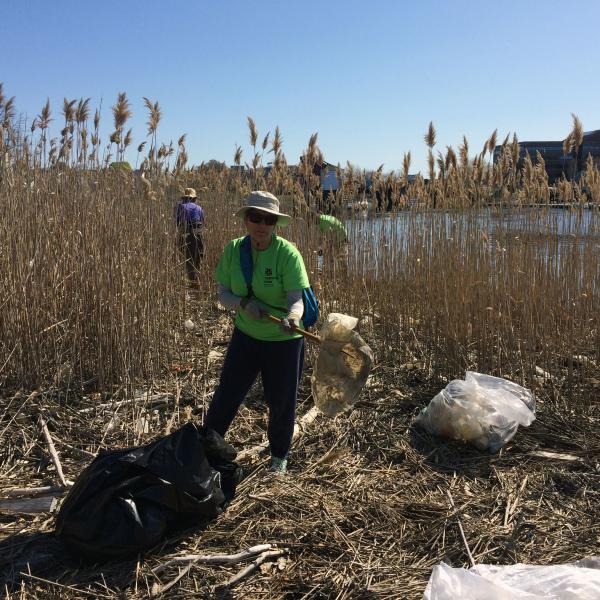May 4, 2016

Rita McCarthy of Dorchester resident helped to remove debris, including many plastic bags, during a clean-up held last Saturday, April 30 near the Neponset Greenway trail in Cedar Grove. Cole Rosengren photo
Volunteers found many types of litter alongside the Neponset River on a recent weekend morning – barnacle-crusted beer bottles, polystyrene foam chunks, old tennis balls - but one type – the plastic bag – has been getting a lot of attention lately. An increasing number of residents agree that they have got to go.
When asked what Boston should do about the bags, nine-year-old Lily Harney was quick with a response: “We can get rid of them as quickly as possible,” she said while collecting trash along the riverside trail.
Harney and other Girl Scouts from the Mather School joined dozens of volunteers that day as they plunged into the marsh grass to clean up what their fellow residents had left behind. All those asked said they had stopped using plastic bags in their daily routines.
Known for getting caught in trees, clogging storm drains, and entangling wildlife, plastic bags have become a popular target. Bag bans or fees have been enacted in nearly 30 municipalities around the state, and the number is growing. And now, a campaign has been launched to get them banned in Boston.
“Other problems are overwhelming,” said Mary Grady, a member of the local advocacy group Ban the Bag Boston whose daughter, Eleanor Pelletier, is part of the Mather School troop that has taken up the cause. “This feels doable.”
Since it was formed last year, Ban the Bag Boston has been making its case at civic association meetings, holding film screenings, and distributing reusable bags to raise awareness of its effort. Grady says she is inspired by the progress that has been made in cities such as Portland, Maine, Austin, and Oakland and by the fact that people from all generations have joined the effort. “In Boston, it seems like we can all agree on this,” she said.
The next step for the group is getting the City Council to propose legislation. Representatives from Ban the Bag and other organizations met with Councilors Michelle Wu, Matt O’Malley, and Andrea Campbell recently to discuss the issue.
"I think it's early in the process, but certainly there seems to be an appetite,” said O’Malley, chair of the council’s environment and sustainability committee. “We want to make sure that we can address this in a thoughtful and effective manner."
The issue has proven contentious in a number of cities and states due to arguments about a ban’s effect on low-income communities and what are seen as challenges for shoppers. Statewide legislation has been proposed, although O’Malley is more inclined toward a local solution. He plans to meet with advocates again next month.
Neighboring Brookline, Newton, Cambridge, and Somerville have already approved bag ordinances and the pressure is growing. Students at UMass Boston, for example, are working to have plastic bags banned in the campus bookstore.
In Mission Hill, teens from the non-profit community organization Sociedad Latina have been gathering hundreds of signatures in support of a bill by knocking on doors and talking to people on the street. While some residents don’t support a ban, many have been receptive after learning more about the issue. The group has designed its own reusable bags and is planning more community education projects for the summer. They were also at the meeting with city councilors and will be a part of the process going forward.
“It’s a habit that’s hard to kill,” said Wilmer Quinones, the group’s youth engagement coordinator. “It’s really sad to see that we are using things that we think are beneficial for us, but at the same time are harming our environment.”
One of the cleanup event’s organizers, Sierra Rothberg, said it’s become so common to have plastic bags floating around that people don’t notice anymore. She feels that a ban would be a good first step toward making people think more about their effects on the environment, although she acknowledged it could be a long process.
“It’s a change of behavior and once you do it it’s not a problem,” she said. “It’s going to happen, but it’s going to be a while."
Topics:


